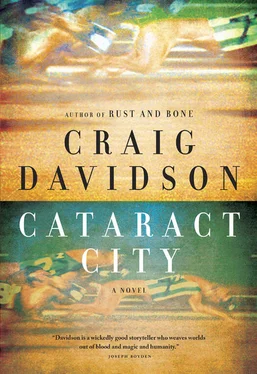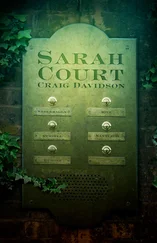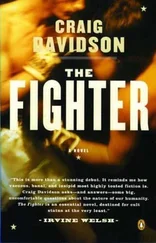Was I scared? Shit, yeah. We were lost and cold and hungry and terrified that we’d be torn apart by the makers of those soft, sinister noises that rebounded within the night pines. But I wasn’t scared of the man who’d brought us there. If you were to ask Dunk he’d say the same.
But all this happened a long time ago, when we were kids. If there’s one time in your life you want to remember fondly, it’s those years.
The man who took us into the woods was our hero, back when we were young enough to believe in those. Big heroes, you know? Larger than life. As you grow up you find most heroes are the same size as anyone else; their heroics are small, selfless and continual. Back then we believed in the ruddy breed of heroism depicted in the G.I. Joe comics we’d read on rainy afternoons in my basement, water trickling through the downspouts like clicking marbles. We believed heroes like that existed because the world seemed huge enough to hold them. The world still seems huge now, but in a sometimes depressing way that I can’t quite explain. As boys, it was only hugely unknown. Just because we’d never met such men wasn’t proof that they didn’t exist.
Then we met our first hero in the flesh. He was the sort of creature who didn’t seem like a man at all. He gave no sense of being made out of the same ever-failing parts that other men — our own fathers —were cobbled together from. He looked every inch the superhero, with muscles where there shouldn’t rightly be muscles. He inhaled the same air as we did, but I wouldn’t have been surprised to find out he had gill-flaps on his neck that helped him breathe under water or microscopic barbs on his fingertips that let him climb the tallest buildings without fear. He was perfection in the raw. A perfection that was undisciplined and maybe even unwanted: he’d occasionally frown during a match — a fleeting frown as if to say the expectations his perfection created were a small burden. But surely now and then even Superman wished he could ditch the red cape and settle down in the suburbs, right?
On the first Saturday of every month the two of us would head to the old Memorial Arena with our fathers. Our hero would high-step through a blistering fan of fireworks wearing a fur-edged robe, dark hair whipping round his face like a lion’s mane. You couldn’t have convinced me he was anything less than a minor god who, having disrupted the order of Olympus, had been cast down to earth for a thousand years of penance amongst the fallen.
His name was Bruiser Mahoney. Dade was the name his mother gave him. Rathburn is the name on his tombstone. But he told us to call him Bruiser.
It was Bruiser Mahoney who took us into these very woods. We went willingly. That’s what we mortals do with our heroes: we follow.
A bat flashed across the headlights, wings spread from its black walnut body, chittering on its way to the hunting grounds.
“Behold zee creatures of zee night,” I said, a bad Bela Lugosi. “Vhat bee-ootiful music zey make.”
My voice was a croak; I laughed, and the sound travelled past the headlights, hit a wall of darkness and echoed back at me. I sat back inside the car and cranked the heater against the chill that had settled into my flesh. The antenna pulled in a station south of Buffalo; the DJ cued up “Who’ll Stop the Rain.” The heat made me sluggish; I shut my eyes to the sound of Fogerty’s wounded baritone, letting it carry me back.

THE NAME ON MY BIRTH CERTIFICATE reads Owen Gregory Stuckey, but as a kid everyone called me Dutchie. Later it would become Dutch, but for the early years of my life there was always that extra ie .
People used to ask if I got the nickname because my family was from Holland, but that wasn’t it. Before I was even a year old I had a brown mop that grew straight down. Mom chopped it below my ears, so the thick ends looked like the bristles of a broom. Mom thought I looked like the little Dutch Boy on the cans of paint.
On the first day of school Mom introduced me to the kindergarten teacher: “This is my son, Owen, but everyone calls him Dutchie.” Never mind the fact that maybe I didn’t dig the nickname. I was five years old. It’s not like I cut my own hair or insisted it be styled into a horrible Prince Valiant, right?
The teacher called me Dutchie. Kids called me Dutchie. The die was cast. In the end, I didn’t really mind; it’s not like Dutchie was so much worse than Owen, which is kind of a nelly name. A few years later Mom named our new puppy Kyle. Our dog got a human name while mine was more suited to a dog.
Duncan was the one kid who called me Owen. But usually he shortened it to Owe. I called him Dunk, same as everybody else.
We grew up in Niagara Falls, also known as Cataract City — a nickname based on the Latin word for waterfall, I learned in class. But my mother, a nurse, said there was an above-average rate of actual cataracts in the city, the eye kind, which often led to glaucoma. For this reason Mom was in favour of legalizing medical marijuana. She’d never smoked pot herself but hated to see people in pain.
“The worst they’d get is a bad case of the munchies after smoking those doobs,” she once said, earning a raised eyebrow from Dad.
As a kid, I found it tough to get a grip on my hometown’s place in the world. What could I compare it to? New York, Paris, Rome? It wasn’t even a dot on the globe. The nearest city, Toronto, was just a hazy smear across Lake Ontario, downtown skyscrapers like values on a bar graph. I figured most places must be a lot like where I lived: dominated by rowhouses with tarpaper roofs, squat apartment blocks painted the colour of boiled meat, rusted playgrounds, butcher shops and cramped corner stores where you could buy loose cigarettes for a dime apiece.
When I was seven or so, riding the bus with my mom, I heard an old geezer rattling on about our city. He had webs of shattered veins in his nose and carried his anger like a pebble in his shoe. Later I’d discover that my city was full of men like him, haunting the Legion Halls and barbershops. I recall what he said verbatim — partly because of the weird mix of venom and resignation in his voice, and partly because of his inventive use of cuss words.
“You want to know how Niagara Falls came to be?” he said. “America swept all its shit north, Canada swept all its shit south, and the dregs of the dregs washed up in a string of diddly-ass border towns, of which Cataract City is undoubtedly the diddliest. Who else takes one of the seven wonders of the world — the numero uno wonder, the Grand Canyon can kiss my pimpled ass — and surrounds it with discount T-shirt shops and goddamn waxwork museums? May as well mount the Hope Diamond in a setting of dog turds. Can’t hack it in Toronto? Come to Cataract City. Can’t hack it in Buffalo? Cataract City’s waiting. Jumped-up Jesus Kee -rist ! Can it get much sadder? It’s like finding out you can’t hack it in purgatory and getting your ass shipped straight to hell.”
He’d stared out the bus window, lip curling to touch his nose. “Welcome to hell, suckers.”
I remember, too, how nobody on that bus rose to the city’s defence.
My father worked at the Nabisco factory on Grand Avenue. The Bisk, as it was known. If you grew up in Cataract City and earned a university degree, chances are you left town. If you grew up in Cataract City and managed to finish high school, chances are you took a job at the dry docks, Redpath Sugar, the General Motors plant in St. Catharines or the Bisk. Plenty of the jobs were simple enough that any half-competent person could master them by the end of their first shift. One of my schoolmates’ dads filled sacks of iced tea mix. Another drilled holes in ignition-collar locks. The only question was whether you could do that same task eight hours a day for the next forty years.
Читать дальше













